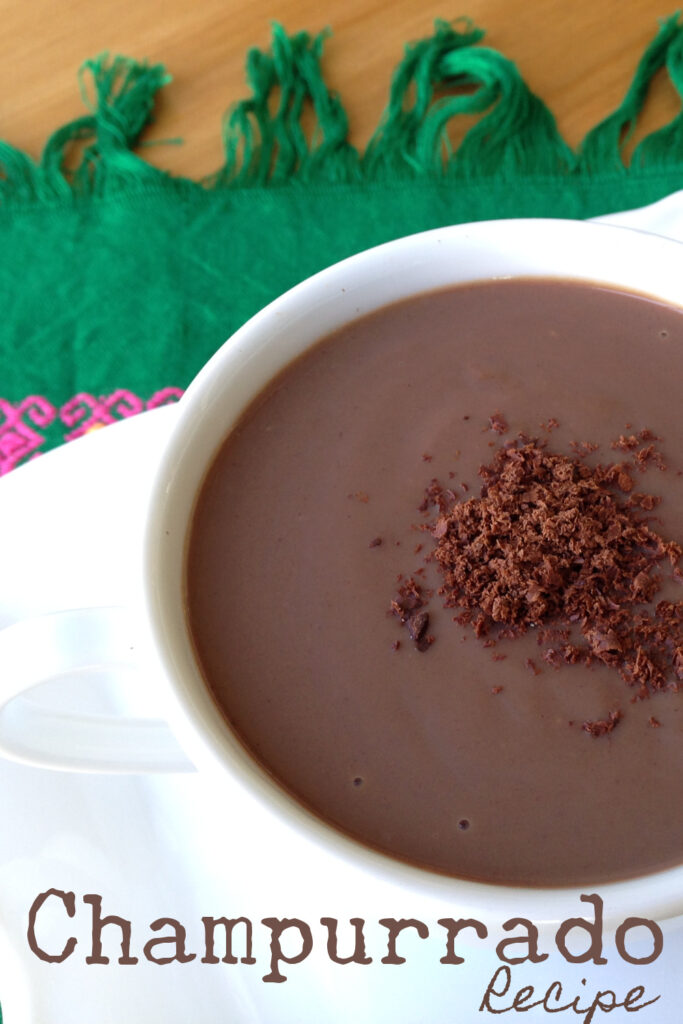What is Atole and Champurrado?
Champurrado is a hot beverage found mostly in Mexico that consists of milk or water, corn, sugar, and chocolate. Most people refer to it as atole, which is a thickened corn based drink, but the correct name, when it includes chocolate, is Champurrado. Atole is any corn thickened drink, champurrado is when you add chocolate to an atole. Although, you would be correct to call it atole de chocolate, be aware that in Oaxaca, Mexico there is a local drink called ChocolateAtole that has nothing to do with champurrado.
There are hundreds of recipes for thickened, corn based drinks throughout Latin America and most of them are simply called atole. Some are made with fresh sweet corn, others with ground toasted corn, and others with masa – boiled corn in lime salt. In California we grow our own corn to make atole but most city dwellers in Latin American make this drink with corn flour or corn starch. Atole recipes vary depending where you are in Latin America and even vary by region within a country.
Champurrado is by far my favorite hot drink of Latin America – it’s rich, creamy, sweet, and beyond comforting. It is often compared to egg nog but champurrado is always enjoyed warm (never cold) and truth be told, there is nothing like it anywhere else. It is ubiquitous during the December holidays, Day of the Dead, or any morning in Mexico. It is a drink, a meal, a celebratory food, and it can most certainly be a dessert.
On the border of Michoacan/Colima, Mexico, where my parents were born, the champurrado is made with fresh ground corn that has been boiled in lime salt, better known and nixtamal. This is the same dough that is used for making tortillas or as a thickening agent for stews. In the USA you can buy masa made with nixtamal at any Latin grocery store or the second best option is to use Maseca – dehydrated masa from nixtamal. The flavor of fresh masa is irreplaceable. If you have the option please opt for masa not the corn flour. If you are in Texas, California, New York, Illinois, Arizona, Colorado, or Nebraska chances are you can find masa made with nixtamal at the Latin Market. Mexicans do not exist without tortillas and tortillas cannot be made without masa. And guess what? You can also see my post on how to make atole or champurrado with a tortilla.
In Mexico you are more likely to find atole and champurrado sold by street vendors than in a coffee shop or restaurant. And you are more likely to see them early morning or late evening. Both images below are in Mexico City early morning; breakfast. And they are gone by lunchtime.
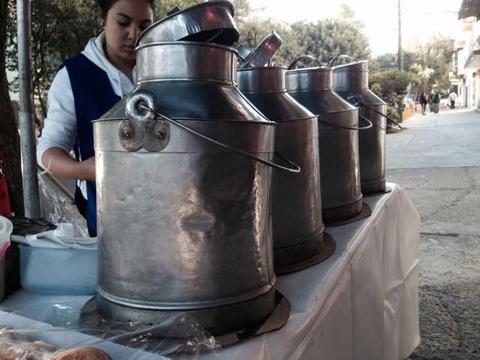
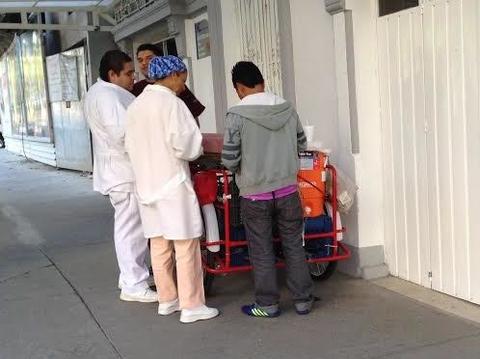
In Guatemala I found an atole that blew my socks off, there it is called atol de elote. I was expecting something made with masa but this was a puree of fresh sweet corn topped with whole sweet corn kernels. And it was water based. I never thought I would accept a water based atole into my life but I was transformed. So even if you decide to not use chocolate, there is still room somewhere in your life for atole.
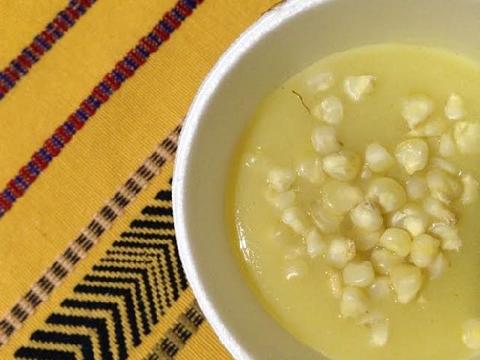
If you want to start your champurrado from scratch kudos to you. Follow these 8 steps:
- Grow some Mexican corn. Color does not matter as long as it is corn for making tortillas – it can be white, yellow, or blue corn. But it cannot be super sweet corn.
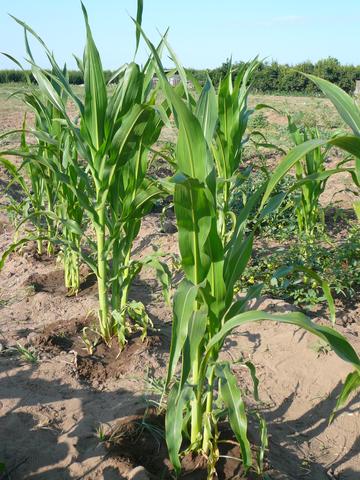
- Let the corn dry on the stalk.
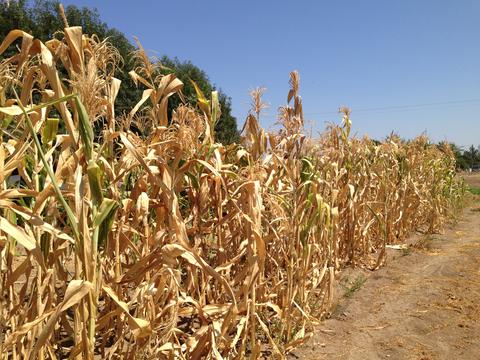
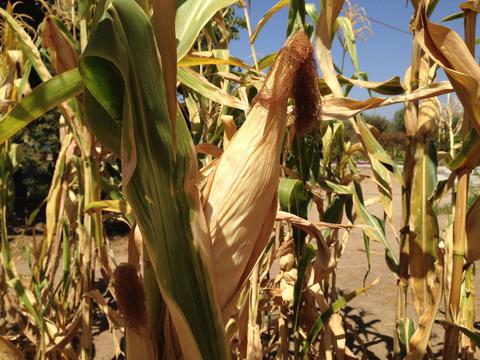
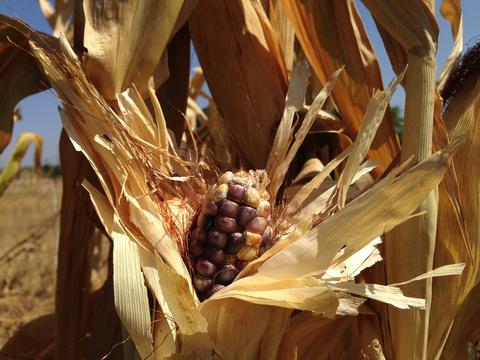
- Or if you are afraid the cows or goats will get to it, cut from the stalks but leave corn cobb in tact encased in the leaves. Let dry completely, about 2 months. You can also buy these dried corn kernels online or from a very Mexican store.
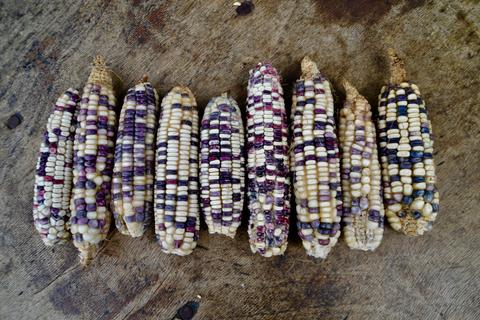
- When completely dry, remove the kernels from the cob and rinse.
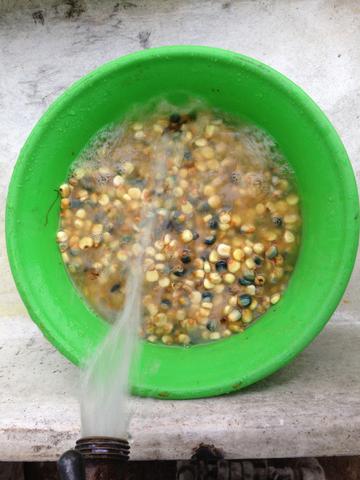
- The process of nixtamalization needs to happen to make masa, whether it is for atole or tortillas. This means you have to boil the corn in water with an alkali. The most widely used is calcium hydroxide/slaked lime or cal (kahl). Sometimes this can be replaced with wood ash.
- Set your corn in a large pot and cover completely with water. Add 1 tablespoon of cal per 1 pound (1/2 kilo) of corn. Boil the pot for about 2 hours then remove form heat and let sit in its water for about a day or overnight. Until the corn begins to release its outer skin.
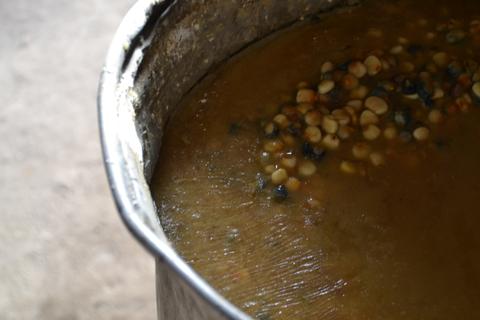
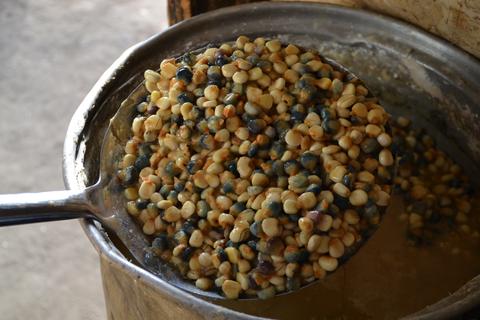
- After the corn is soft, rinse thoroughly about 5 times to remove all the dirty water. Don’t drink it. Now that you have your clean nixtamal you need to grind it. At home we have an electric molino, traditionally you would grind on a metate (stone), but you can also grind in a food processor. Grind it and feel it, if it’s still gritty grind it again. It’s ok if its a little dry, you can add a bit of water to make it hold together.
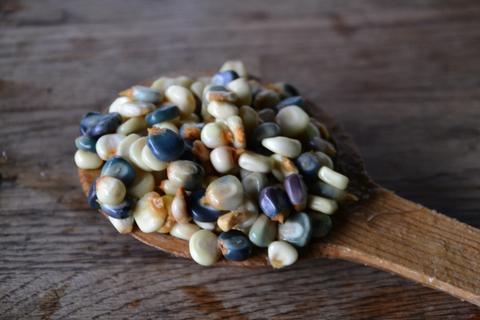
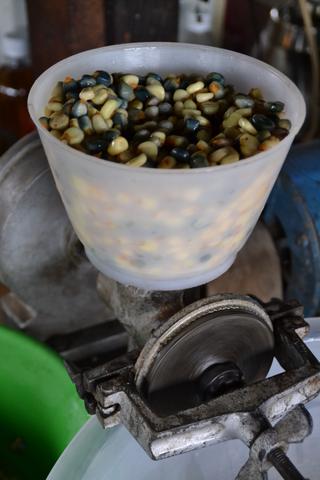
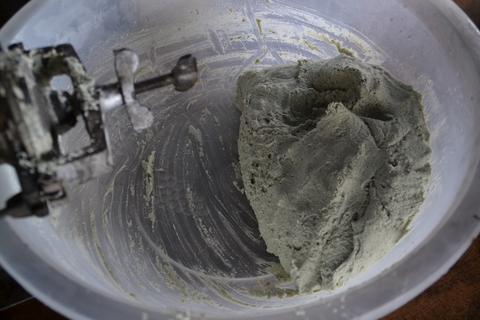
Congrats! You can make anything with this golden masa: tortillas, sopes, tamales, tostadas and much more! You have unleashed the greatest secret of Mexico and also the reason so many Spaniards died of malnutrition when they conquered the new world; they thought it efficient to skip this process of nixtamalization and use their big powerful machines to grind the corn. It turns out this process unlocks vitamins and minerals.
At this point you can use it all for your culinary experiments or make a few balls to freeze for later use, they keep exceptionally well in the freezer. These frozen balls come in handy when I want to make atole but don’t want to go through this long process again. They also thicken soups, stews, and sauces very well.
Technically, to truly make this recipe from scratch, I would have to describe here also how to milk your cow and how to make the chocolate … for the chocolate go here: How to Make Chocolate.
Easier recipe to make champurrado …
Buy the masa already made at the Latin grocery store. They usually sell it in small bags in the produce or bakery section. It has to be kept refrigerated unless or it is sometimes made to order.
When you go to the store and ask for masa they will ask you, “para tortillas o tamales?” Don’t panic. They are asking if you want masa with or without lard. Masa for tortillas has no added lard, masa for tamales has lard and maybe spices. You need masa for tortillas. Or sometimes they ask in a different way, “con manteca (lard)?”. There is a time and a place for lard, but not in your champurrado. Always remember to buy masa for tortillas.
Same idea here, it is a smart move to buy a kilo of masa and freeze what you do not need immediately, this ensures you have masa for later pleasure.
Easiest recipe to make champurrado …
If you want the easiest route, go to the store and buy corn flour – Maseca is the most popular brand in the USA. If you walk into a grocery store and you do not see this tower of Maseca (image below), you are likely not at the Latin grocery store and might not find Mexican corn flour. Do not confuse Mexican corn flour with polenta, corn starch, or any other type of corn flour. It has to be a Mexican corn flour for making tortillas. This also can be any color but it is usually made with white corn.
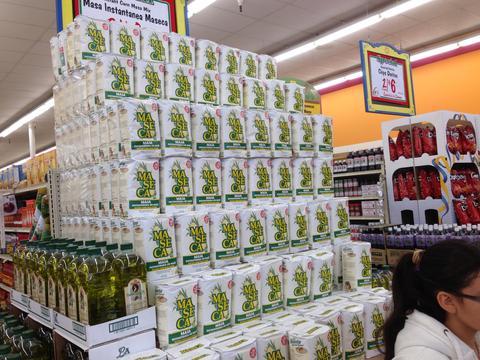
Whether you start with corn, store bought masa, or corn flour the next steps are all the same.
Dissolve your masa in the liquid you will be using then cook that liquid with the chocolate or whatever flavoring you will use. Coconut, fresh fruit like strawberries, spices like cinnamon or cloves … all work well here. Most important factor is to constantly stir while cooking because this will burn if left unattended. Below is a recipe for champurrado. Let me know how it goes.
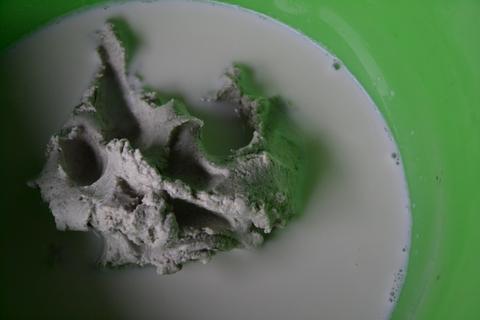
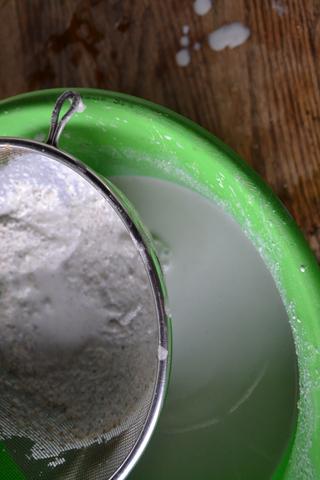
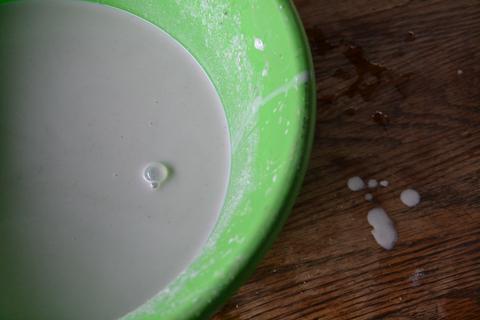
Champurrado Recipe
- Total Time: 15 minutes
- Yield: 2 servings 1x
Description
Corn thickened chocolate drink from Mexico.
Ingredients
- 2 cups (500g) whole milk. I prefer milk but you can absolutely do this with water or milk alernatives. Be aware that some milk substitutes have thickeners, this will affect cook time. Cook a few minutes less if you will use milk substitutes.
- 2 tablespoons (20 grams) masa flour or masa dough.
- 2 packed tablespoons (40 grams) of piloncillo, rapadura or dark brown sugar. You can add more or less. 40 grams is pretty sweet but it is my level of goodness.
- 30 grams 70% dark chocolate. Traditional recipes use 20 grams of chocolate because chocolate is an expensive ingredient. Sometimes when I am sad I use 40 grams. Anywhere between 20 grams and 40 grams of chocolate will produce a good champurrado.
- 1/2 of one Ceylon cinnamon stick- optional. Super traditional but will overwhelm chocolate flavor. Has to be “Mexican” cinnamon also known as Ceylon cinnamon. Not the same cinnamon used for cinnamon buns.
Instructions
- Dissolve the masa in your milk or water. Use your hands to help it dissolve or a whisk to dissolve. Dissolve until there is no more visible masa or flour.
- Put a strainer over a pot and pour the milk already with the dissolved masa in the pot.
- Add the sugar and cinnamon stick (if using) and bring to a boil while constantly whisking. This can burn or boil over quickly.
- You need it to come to a boil to cook the corn flour. Once it has boiled for 30 seconds, turn heat down or remove from the heat and add the chocolate. Constantly whisk.
- Allow the chocolate to melt with little or no heat and let the mix become one. It should turn the color of chocolate.
- You don’t want this to boil again but you do need to return it to the heat to allow to thicken.
- Constantly stirring and being mindful of the mixture sticking to the bottom, continue to cook for about 2 minutes. It will begin to look like a custard or a cream soup.
- You can try the custard test, dip a spoon and remove it, when it completely coats your spoon, it is ready. It will thicken as it cools. If it thickens too much you can add a tablespoon at a time of your milk/water, to help make it less thick.
- If it does not want to thicken, it means that it does not have enough masa. Dissolve a little bit more in milk or water and strain into the pot. If it thickens too much add more liquid. The correct consistency is thick. Thicker than heavy cream but not thick like mayo.
- Pour into your cup and wait a few minutes because this is piping hot and it will burn your tongue. Usually I begin to drink this with a spoon. Scooping only the top layer that has cooled. Please let this cool. I burn my tongue every time.
- You can save left overs in the fridge up to 2 days but when you reheat you will need to add more liquid because it will be twice as thick after you refrigerate. This is if you want to drink it; my father used to eat these days old champurrado with a spoon.
- Prep Time: 10 minutes
- Cook Time: 5 minutes
- Category: hot chocolate
- Method: boil
